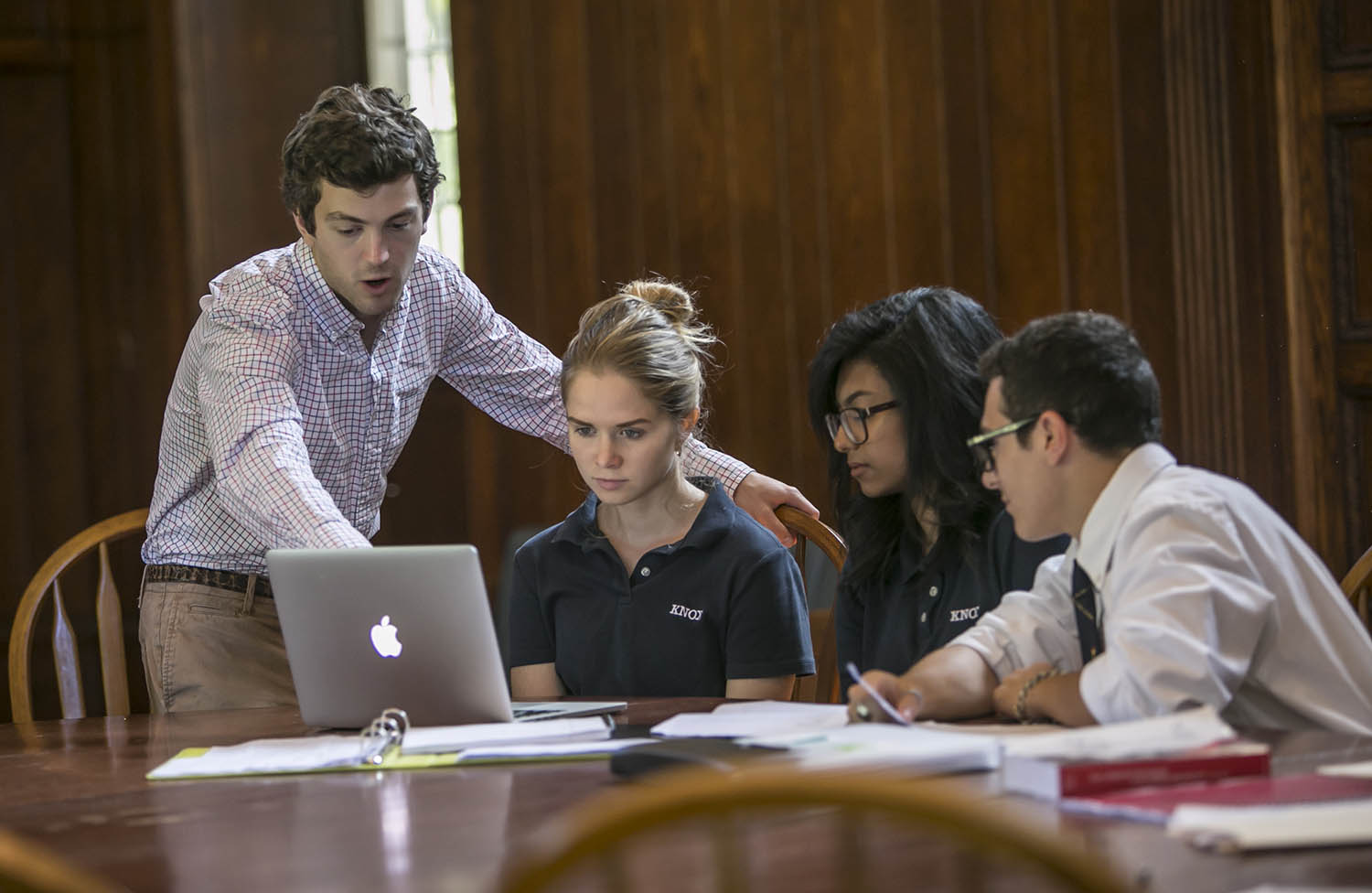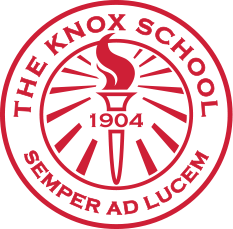
The History Department at Knox strives to teach students to “think like a historian.” The development of historical thinking skills aids students in their understanding of primary and secondary source research and encourages them to think independently and critically. The history department achieves this goal through critical analysis of sources, student-led discussions, and the development of writing. The history department also works to create 21st Century learners by encouraging a collaborative environment amongst students and allowing students choice in creatively expressing their knowledge.
World History I, H (9) : Early Human History to 1750
The first phase of a two-year course, students explore a chronology from Ancient Times to the First Global Era (ending about 1750 CE), organized around several key themes and concepts: Early Civilizations (4,000 BCE – 1,600 CE); Empires of the Ancient World (to 200 CE); and Regional Civilizations (to 1,200 CE). When studying the Early Common Era, students gain an understanding of early empires and other civilizations around the globe. Students also examine issues such as the African slave trade, cultural interactions among varied peoples, and global trends. An understanding of geography, history, economic systems and political institutions as well as social and cultural elements basic to the study of human development will be cultivated. Over the course of the year, students think critically about these and other issues, and in the process, develop important intellectual and analytical tools from structuring an argument and academic composition to research and oral presentation skills.
World History II, H (10): 1750 to present
The second phase of the two-year World History and Geography sequence, students will explore major turning points in the shaping of the modern world, from the time period of the Age of Absolutism and the Enlightenment to the modern day. Emphasis on geography, cultural underpinnings, economics, and political systems on the continents of Europe, Africa, Asia and the Americas characterize the course experience for the year. Topics of study include: Enlightenment and Revolution, Industrialism and a New Global Age, World Wars and Revolutions, and a focus on current events, which draws connections to events of the past. Prerequisite: World History I or equivalent 9th grade History class.
U.S. History, H/Pre-AP (11)
United States History and Government is the study of the inception and development of American representative democratic and political traditions. The course focuses on the people, the geography, the development of American cultural values, social institutions, and global relations. Students study the major social, political, and religious developments in United States history, and are required to use a variety of intellectual and critical thinking skills to demonstrate their understanding of major ideas, eras, themes, developments and turning points. Prerequisite: World History II or equivalent 10th grade History class.
United States Government and Politics (12)
U.S. Government and Politics is a class designed to acquaint students with the origins, concepts, organizations, and policies of the United States government and political system. The U.S. Constitution and its Amendments will be examined and students will investigate the development and sweep of civil rights and liberties. Significant Supreme Court decisions will be analyzed to demonstrate the impact and importance of constitutional rights. Students are guided through the function of government today and the role of citizens in the civic process. They will also engage in disciplinary practices that require them to read and interpret data, make comparisons and applications, and develop evidence-based arguments. Prerequisite: U.S. History or equivalent 11th grade History class.
Honors History Designation (9-12)
Students who are interested in further challenging themselves and in earning Honors/pre-AP credit are placed based on their grades and teacher recommendations, with final approval by the Dean of Academics. These courses require academic skill, greater commitments of time and effort, and an eagerness to learn. Students must maintain a grade of 85% or above to remain in Honors and pre-AP.
Foundations of Economics (11, 12)
This course integrates micro and macro economics and personal finance concepts to help students better understand the implications of economic events and make informed financial decisions. Students will examine the basic types of economic systems with an emphasis on the American capitalistic economic theory and its implementation and development. The course introduces economic reasoning as well as techniques and processes of thinking used by economists. The focus is on the basic principles concerning production, consumption, and distribution of goods and services (the problem of scarcity). Students analyze the interaction of supply, demand, and price, the principles guiding household economics, the economic organization of business, agriculture and labor, and the national economy. The course also incorporates instruction in personal financial literacy.
AP Psychology
AP Psychology is a social science course recognized by the College Board and gives students a foundation in the major areas of study in psychology, including, but not limited to: scientific methods, biopsychology, human development, cognition, and individual and group behavior variation. The focus of this course is to help students understand psychology as a scientific discipline, as well as to increase the student’s confidence in discussing and writing about psychological principles in a scientific manner. This class will be an intense reading and writing program, at times. It is designed to the equivalent of a College Psychology class. Expectations for this class will be high and the assignments are meant to be challenging. At times, this will require exceptional time management skills and additional hours outside of class to complete assignments and meet grade expectations. This course is designed to develop and build upon complex practices and learn collegiate level foundational skills.
Introduction to Legal Studies
This course will offer students a foundation in the American legal system. Students will learn and master the basics of reading and analyzing laws and applying them properly to relevant cases. This will springboard into reading and analyzing cases for important and key details to make a proper case based on the applicable laws and write case decisions. Once the basic analytical and writing skills are mastered, the class will move on to learn an understanding of the process of court proceedings through Mock Trials.
AP United States Government and Politics (12)
A.P. U.S. Government and Politics provides an introductory college-level, nonpartisan introduction to key political concepts, ideas, institutions, policies, interactions, roles, and behaviors that characterize the constitutional system and political culture of the United States. Students will study U.S. foundational documents, Supreme Court decisions, and other texts and visuals to gain an understanding of the relationships and interactions among political institutions, processes, and behavior. They will also engage in disciplinary practices that require them to read and interpret data, make comparisons and applications, and develop evidence-based arguments. Prerequisite: Successful completion of Honors/pre-AP U.S. History and approval from the AP committee.
Honors and pre-AP History Designation (9-12)
Students who are interested in further challenging themselves and in earning Honors/pre-AP credit are placed based on their grades and teacher recommendations, with final approval by the Dean of Academics. These courses require academic skill, greater commitments of time and effort, and an eagerness to learn. Students must maintain a grade of 85% or above to remain in Honors and pre-AP.
History Faculty
Kelly Mandia
M.A., History – Long Island University
B.A., History, Minor, Social Studies Secondary Education – Stony Brook University
Kelly Mandia
History, Economics & Government Teacher
Patrick McCormick
MA., Adolescence Special Education – St. Joseph’s College
B.A, History in Secondary Education – St. Joseph’s College
Patrick McCormick
Stephanie Kilgannon, LMHC, CASAC-T, CAMS-II
M.S., School Counseling – New York Institute of Technology
M.S., Mental Health Counseling – Alfred University
Stephanie Kilgannon
Psychology Teacher


